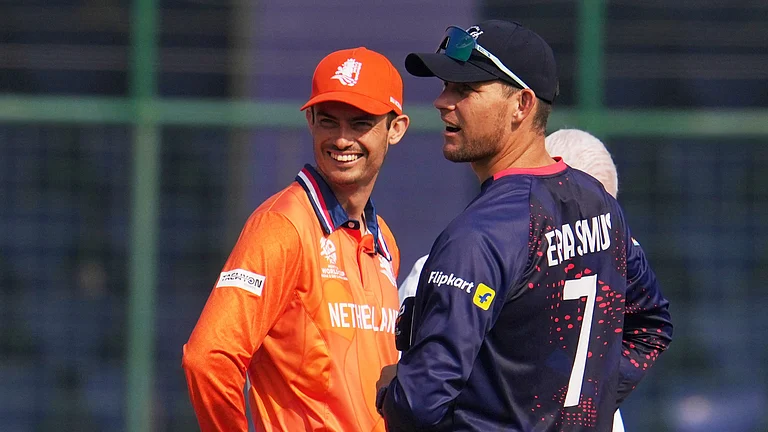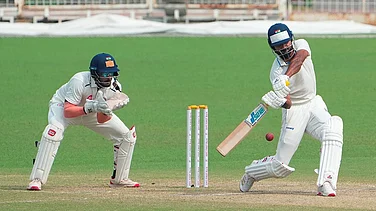Before the Port-of-Spain Test, of the 46 Tests Australia had played withSteve Waugh at the helm, they had lost just seven (winning 34 and drawing five).Two of these losses were effected in Waugh’s first series as captain inearly-1999, practically single-handedly by a gentleman called Brian CharlesLara. No disrespect meant to the talents or contributions of the other WestIndians in those sides -- it just turned out that way.
Yesterday, Lara, this time aided by strong contributions from his teammates,was looking poised to take his tally against Waugh’s invincibles to three.But, right after lunch, the same teammates showed a preference for the pavilionthan the pitch. And, that was that! What was shaping up into a humdinger of acontest in the morning, with uncanny reminisces of an epic run-chase atBridgetown, Barbados, four years ago, turned into a lop-sided contest the otherside of lunch.
The West Indies started the day at 107-3, needing a further 300 to win in 90overs of play. They did everything asked of them in the first session. RamnareshSarwan, the brightest batting prospect to emerge from the islands sinceShivnarine Chanderpaul, sealed up one end. At the other, Lara was his usualself, a resolute mix of dogged defence and striking flair, scoring at close tofour an over, and keeping his side well in the hunt.
The Australians came at him hard, especially Brett Lee. On a dusty trackoffering absolutely no assistance to the quickies, and with a rampant Larastriding into the nineties and looking good for his first Test century on hishome ground, Lee reverted to the oldest and most-effective intimidation tacticin cricket: the short ball.
He bent his back like a mule for seven fiery overs, put the ball in the rightspots and really made it rear up into Lara’s body. Lara hobbled at the crease,one snorter hit him smack on the back as he tried to take evasive action. Thecolourful and partisan Port-of-Spain crowd, sensing the momentary unease oftheir favourite son, got into the match big time.
That first session was a beautiful advertisement for Test cricket. The fifthday of a Test (how common is that these days?). The match itself poiseddelicately, up for grabs. The world champions versus the man who had done themin twice before in similar situations, and was showing every intent of doing itall over again. Who would blink first?
The Windies didn’t blink till lunch. The Aussies didn’t either. However,with the clock inching towards the designated lunch time, a few of them shot offtheir mouths when Lara tried to stall play so as to avoid facing another over.He and Sarwan didn’t face another over. But he did have to face the ire ofsome Aussies, notably Ponting and Lehmann, in between respectful handshakes forLara from some other Aussies. It brought in some more needle into the contest,as the teams retreated to the cool confines of the dressing room, to ponder overthe morning session and plot for another round of confrontation.
At the pre-match meeting that morning, the Windies might have spoken of goingthrough the first session without losing a wicket. And that’s what they haddone, in the process wiping of 103 runs from the target, which, if they managedto reach, would be the highest fourth-innings run chase in the history of thegame. A game was on.
Perhaps, in a moment of doubt, Waugh, his battle-weary eyes hidden behindsunny glares, might have wondered whether his bold declaration had given toomuch latitude to the Windies, in terms of the target and overs break-up (407 in127 overs, or a rate of 3.2 per over).
Perhaps, seeing his bowlers toil wearily to make a breakthrough, Waugh mighthave silently wished that Glenn McGrath -- the spearhead of his attack and Lara’snemesis on many occasions in the past (McGrath has dismissed Lara 13 times inTest cricket) -- was in the middle and probing the batsman outside theoff-stump, rather than sitting with his feet up in the pavilion, having justflown in from Australia after being with his ailing wife, Jane.
The way the game was unfolding, Waugh’s mind might have drifted toBridgetown 1999. Chasing 308, Lara led West Indies to a narrow one-wicketvictory, scoring an unbeaten 153 and adding a precious six for the last wicketalong with the game’s most infamous exponent of the cricket bat, CourtneyWalsh. This, after he had smashed a special 213 in the previous Test to take hisside to a 10-wicket win. Lara butchered the Aussies that series, piling up 546runs at an average of 91. Over the past four years, it had taken somethingspecial to beat the Aussies (besides Lara, think Laxman, Butcher and Vaughan),and once more Lara had laid the platform for the assault.
But then, this is Australia, the side that invariably finds a way to win.After lunch, the Aussies tightened up, with the intention of squeezing the runflow and playing for the new ball, which was 15 overs away. MacGill, who wasspinning his leggies like a top (to give some indication, one delivery pitchedtwo inches outside the offstump and spun such a long way that umpire Asoka deSilva, rightly for once, called it a wide) but bowling one full toss an over inthe morning, cut the frills.
From the other end, Waugh, probably wanting to hold back Gillespie and Leefor the new ball, available in an hour’s time, threw the ball to that ultimateteam man Andy Bichel, whose journey from the perennial twelfth man to an ‘all-rounder’is well-documented by now.
Wicketless in the past two Test innings and with McGrath back in thereckoning for a Test spot, the ever-smiling, ever-obliging Bichel seemeddestined to go back to drinks duty for the remainder of the series.
He probably will (unless Gillespie breaks down yet again!), but he will goback with his head held up high and with his tag of being the best twelfth manin the business intact. In five overs, with deliveries that were more regulationthan works of art, Bichel dismantled the West Indian middle-order in a five-overspell.
Sarwan gone to a miscued pull for a well-crafted 34 of 87 deliveries, Samuelstrapped in front for 1 and debutant David Bernard caught low down at first slipby Hayden for 4. Just 18 runs had been added since lunch, and the momentum hadshifted in favour of the Aussies.
From the other end, Lara watched in dismay and probably with a heavy heart,as his soldiers walked away from the battle without putting so much as a fight.All Lara wanted from the likes of Sarwan and Samuels was to hold their end up;he would keep the scorecard ticking -- a strategy that was so obvious and, moreimportantly, workable.
Lara on song is a delight to watch, in terms of sheer entertainment value,offering even more than that other pint-sized genius, Tendulkar. UnlikeTendulkar, who often gets shackled by thoughts of the value of his wicket to histeam and adopts a measured approach to batting, Lara mostly plays with gayabandon. If the ball is short, he pulls imperiously; if it’s over-pitched, hedrives through the line. He scores the bulk of his runs in boundaries.
It’s a style of play that works well in the small West Indian grounds,where the square boundaries are relatively closer. It means that even if thereare men patrolling the fence, Lara can back himself to leave them stranded withhis exquisite timing. It means that even if the run flow is temporarily chokedduring a tight stage, there’s always the chance to open the taps again.
After those stifling and damaging spells by Bichel and MacGill, and with thefragile West Indian tail exposed, Lara never did get a chance to open the taps.Three overs later, an extravagant, though intended, top edge was snared byHayden at slip (who took five catches in the game, including some neatgrounders, at first slip -- not his regular position).
As he trundled back for 122 (five hours, 208 balls, 13 fours, one six), Lara,and many among the people watching, might have wondered what might have been hadSarwan restrained his impetuosity. History might well have been rewritten.
Lara gone, it was just a simple matter of completing the formalities, whichthe Aussies did while breaking into a little bit of sweat. In the end, themargin of victory was 118 runs. Yet again, Australia, when put under the mat andprobed with teasing questions, had successfully come up with the answers. Notwith any magical or sparkling performances, but with good, solid, back-to-basicscricket, backed by dollops of self-belief.
Although leading the four-match series 2-0, thereby retaining the FrankWorrell Trophy for Test cricket between the two nations, there are chinks in theAustralian armour. The bowlers, in particular, have laboured to get the Windiesout in pitches and conditions that are not so bowler-friendly as they are usedto back home. Lara, Daren Ganga and Chanderpaul have shown, albeit fleetingly,that the Australians are just as vulnerable and lost for ideas during bigpartnerships as the other teams.
Warne and McGrath have been sorely missed, though it’s not so evident sincetheir batters have so far always given their bowlers a bank of runs to playwith. Filling in for Warne in one-dayers is quite different than in the game’slonger version. Reasonable accuracy and an opposition taking risks will giveeven the ordinary bowler a look-in the one-dayers. In Tests, though, variety,guile and control are the weapons for a spinner, and there’s no one inAustralia better than Warne.
McGrath will, in all likelihood, return to the side -- at the expense ofBichel -- and resume his intense duels with Lara. There’s no love lost betweenthese two masters of their respective craft. In many ways, Australia has beenLara’s biggest challenge, his moment of reckoning, through the years.
Lara, on his part, has enjoyed scrapping with the Aussies, occasionally anduncharacteristically, even paying them back in their own currency. In the lastseries, evidently after being provoked, he put his helmet into McGrath’s faceand had a heated exchange. Four years later, perhaps, age and circumstancesmight have tempered Lara and McGrath, but neither will hold back in the heat ofa contest.
If Chanderpaul and Chris Gayle return to the side, as is expected, the WestIndies will be full strength in batting for the first time in the series. It’squite a formidable batting line-up, with Ganga looking good at number three andLara being his usual prolific self against the Aussies. There’s a big questionmark over the Windies bowling, though. Not once in the series have they lookedcapable of snuffing out 20 Australian wickets.
All they have in reserve is a rookie speedster called Tino Best, apparentlythe quickest in the Caribbean. Besides being express fast, Tino other’s claimto fame is that he’s the nephew of Carlisle Best, former Windies batsman ofthe eighties who was famous in his time for giving a running commentary on hisown batting, much to the amusement of the opposition!
Tino, though, will have to let the ball do the talking -- and, he’ll reallyhave to make it talk.


























